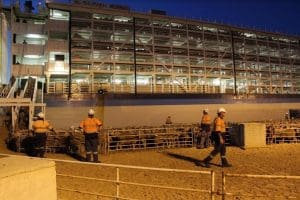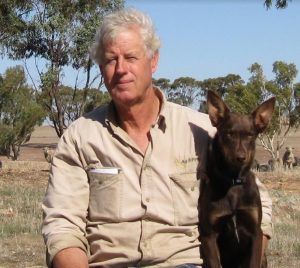
The Al Shuwaikh being loaded at Adelaide earlier this year.
WESTERN Australian exporter Emanuel Exports still intends to ship 60,000 sheep held in a feedlot to the Arabian Gulf, despite an offer engineered by WA Agriculture Minister Alannah MacTiernan to have them processed onshore.
And despite her efforts, WA farmers believe Ms MacTiernan played a role in the latest developments that are expected to impact sheep producers already suffering under difficult seasonal conditions.
Emanuel Exports and its Kuwaiti import partner Kuwait Livestock Transport and Trading are pursuing revised arrangements for the Emanuel shipment, which will need to involve a different export company and Department of Agriculture and Water Resources approval.
It is expected the 60,000 sheep will still be exported to the Arabian Gulf on the Al Shuwaikh. KLTT owns the vessel and the pre-export feedlot near Perth where the sheep have been held since Emanuel Exports’ export licence was suspended last week.
It is hoped a new loading schedule will be clearer by the end of the week. The Al Shuwaikh is now off the coast of Perth awaiting the consignment.
Despite Minister MacTiernan issuing a statement yesterday stating that meat processor, Fletcher International Exports — which has shut down for maintenance until July 18 — is willing to purchase the 60,000 sheep, Sheep Central has been told this arrangement was made without the knowledge of Emanuel Exports and the sheep are not for sale.
Click here to get the latest Sheep Central story links sent to your email inbox.
LSS and Emanuel actions to impact farmers

WAFarmers president Tony York
WAFarmers president Tony York said he had confirmed with Emanuel that the company was looking to export the sheep under another licence.
“I am uncertain about whether they can be returned to the farm, because Western Australia has its own biosecurity regulations that might prevent that.
“You can’t assume at this stage that they can be returned to the farm.”
Mr York said the impact of the current live export situation on WA sheep producers has been compounded by difficult seasonal conditions.
“About 80 percent of the south-west has had a pretty good opening rain and there is some pasture, but 20pc has not had a good opening break for the winter, so this is just added stress for them.”
He said there had also been mixed messages about the slaughter capacity of the WA meat processing sector and its current capacity to process the live export sheep.
“It is very doubtful that there is an immediate killing capacity, given what is reported about these scheduled (abattoir) closure.
“For those sheep stuck in the feedlot, our best hope would be to see if another export licence holder is prepared to take them on.”
Mr York said farmers made the decisions two years to produce the sheep that are ready to be exported live now.
“It’s all very well to argue that we should be finding alternatives, but these decisions were made a long time ago and it is not easy to suddenly switch.”
In January live sheep exporters were paying up to $125 for typical export wether lambs, but this dropped since to $110 at times due to trade uncertainty.
“There is probably clear evidence that on a week to week basis the uncertainty is taking $15-$20 off the price of those animals and maybe if those animals go to an abattoir it is more likely at $30-$40 less than what they would have been getting when the market for export sheep was at its peak.”
With WA’s other major live sheep exporter Livestock Shipping Services also out of the market and reviewing its northern summer Middle East operation and Emanuel’s licence suspended, Mr York said there will be some impact on producers forced to hold sheep that would have been sold to exporters.
“That’s definitely a pressure point for a group of farmers and the bad start to the season for some is making it worse, and some have got the other half of the farm loaded up with lambing ewes – it’s kind of a squeeze for those businesses.
“It could become a very big issue for a group of farmers.”
Live export market loss could involve 500,000 sheep

PGA president Tony Seabrook.
Pastoralists and Graziers Association of WA president Tony Seabrook said the whole situation was “shambolic” with the seasonal conditions.
“There is something like 150,000-200,000 sheep in the state now that would have gone for live export if it wasn’t for the interference that MacTiernan has been running.
“Then you can add to that about another 300,000 or more if this (Emanuel) suspension remains in place,” he said.
“We could have half a million sheep in the state that we had in mind in a season that is less than optimal.
“If animal welfare is the core of the grief we are having, well look out, because it will have a big impact at the back end, rather than at the front end.”
WA Government pressure prompted Emanuel suspension – PGA
Mr Seabrook said he was ‘gobsmacked’ when he heard Ms MacTiernan had claimed she had found a home for the Emanuel sheep “and the deal was done.” He said he was deeply disturbed when advised that Minister for Agriculture David Littleproud’s had no part to play in the licence suspension.
“It’s out of their hands and they are not prepared to step up and do anything about it,” he said.
Mr Seabrook said it was “far more than a coincidence” that DAWR was forced into suspending Emanuel’s licence by WA state political pressure, including the raid on the exporter’s offices last week.
“It was Monday when the raid occurred and it was Friday morning when Emanuel has authority to load and at close of business, the very end of the day, they were told their licence had been yanked.
“It’s too coincidental,” he said.
“Most Western Australian producers hold MacTiernan as being culpable in this matter,” he said.
Mr Seabrook said Emanuel should have been given time to move the 60,000 sheep through the system.
“One week wouldn’t have made any difference, one way or the other, to the enforcement of the law, but it would have made a hell of a difference over here.”
McGowan Government to organise WA industry meeting
The McGowan Government said it would convene and industry meeting this week to develop a longer-term response plan to address challenges in the live export industry.
Most WA meat processors are about to or have already closed for normal winter maintenance, but Ms MacTiernan said processors are working with the State Government to absorb the sheep that cannot be transferred over the next few months
“As it became clear early in the year that live exports during the northern late summer were not sustainable, I brought together Western Australian meat processors to discuss capacity during the period – and they made it clear they could increase their capacity.”
“There are many exciting new opportunities for processed sheep meat in markets like Iran and China.”



It astounds me that the exporters would have applied for, and been granted a licence, to ship this load of sheep some time ago. The government had the opportunity then to decide whether or not to grant it.
Waiting until Emanuels had purchased all of the sheep and accumulated them at Baldivis in preparation for shipping, before deciding to revoke the licence is poor practice.